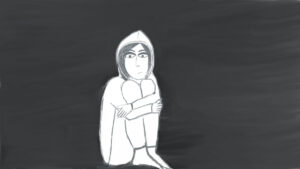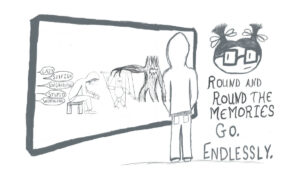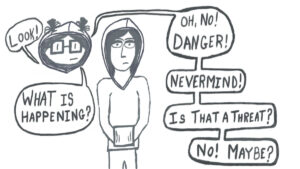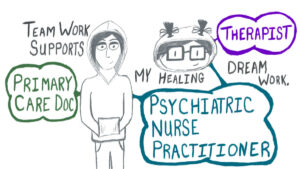What is Complex PTSD?
 What is complex PTSD? Complex post-traumatic stress disorder (C-PTSD) is a term used to describe a medical condition that arises in some people who have experienced repeated and prolonged traumatic events.
What is complex PTSD? Complex post-traumatic stress disorder (C-PTSD) is a term used to describe a medical condition that arises in some people who have experienced repeated and prolonged traumatic events.
These traumatic events can include physical, sexual, or emotional abuse, torture, disaster, or war. Up to 3.5% of the population may suffer from complex PTSD at some point.
The difference between C-PTSD vs. PTSD is exposure to multiple traumatic events over an extended period. For example, C-PTSD can develop after exposure to events such as child abuse, domestic violence, human trafficking, or natural disasters.
Also, the American Psychiatric Association does not recognize complex PTSD, but the World Health Organization does. And many therapists do recognize the difference between PTSD and complex PTSD and treat their patients accordingly.
Symptoms of Complex PTSD
The symptoms of complex PTSD are similar to PTSD, with several additional symptoms.
PTSD Symptoms:
- Re-experiencing
- Avoidance
- Negative Changes in Cognition
- Hyperarousal
Complex PTSD can present with some or all of the above PTSD symptoms and the following:
- feelings of worthlessness, shame, and guilt
- problems controlling your emotions
- finding it hard to feel connected with other people
Re-experiencing
 Re-experiencing symptoms include intrusive memories of the trauma, nightmares, and flashbacks. I have this symptom of complex PTSD with intrusive memories and sometimes nightmares. I used to have flashbacks, but I haven’t had one of those in a long time.
Re-experiencing symptoms include intrusive memories of the trauma, nightmares, and flashbacks. I have this symptom of complex PTSD with intrusive memories and sometimes nightmares. I used to have flashbacks, but I haven’t had one of those in a long time.
Because the intrusive memories are usually around sexual abuse, it triggers feelings of shame and guilt. So I disassociate sometimes because it is an unreal feeling to have those emotions, and sensations suddenly come back. It’s very jarring.

Avoidance
Avoidance refers to avoiding people, places, activities, or thoughts that trigger traumatic memories. Avoidance presents as social withdrawal, avoidance of certain topics of conversation, or avoiding activities that remind one of the traumas.
I socially withdraw and avoid certain topics of conversation. Some people have triggered me to the point that I disassociate. And so, to protect myself, I minimize my interaction with them as much as possible. My emotional health and safety are much more important to me. Knowing that I will be spending time with them causes my anxiety spiral.
When I was younger and still living in an abusive environment, a symptom of complex PTSD that I had was avoiding activities that reminded me of my trauma. For example, I was molested during bath time and in the shower. As a result, I would avoid bathing at all costs. I couldn’t put my face under the water to rinse my face. And I never learned how to swim because of that.
Negative Changes in Cognition
 Another symptom of complex PTSD is negative changes in cognitions and mood involving negative thinking and feelings, such as worthlessness, hopelessness, and despair.
Another symptom of complex PTSD is negative changes in cognitions and mood involving negative thinking and feelings, such as worthlessness, hopelessness, and despair.
I go through this still. I think, in part, it is old programming. My abuser told me all of the time that I was worthless. But there is a different spiral that I have gone through the depressed, suicidal spiral filled with hopelessness and despair.
With my therapist, I work hard on changing what my brain is trying to tell me in those moments. Sometimes it is a game of logic. Like on a tough day, my brain told me to drive my car into the lake. I kept telling myself that the lake wasn’t that deep, I wouldn’t die, too many people drove by that spot, they would rescue me before I died, and I had my dog with me. I kept telling myself that over and over.
Hypervigilance
 Hypervigilance is sometimes known as hyperarousal or extreme vigilance. This symptom of complex PTSD can present as trouble sleeping, irritability, anger outbursts, and difficulty concentrating, which can significantly impact one’s daily functioning.
Hypervigilance is sometimes known as hyperarousal or extreme vigilance. This symptom of complex PTSD can present as trouble sleeping, irritability, anger outbursts, and difficulty concentrating, which can significantly impact one’s daily functioning.
Extreme vigilance is another symptom of complex PTSD that shows up for me significantly. I am constantly on guard, scanning the environment and watching people. I can sense a subtle shift in the energy a person is exuding, and I will hone in on that person to determine if they threaten my safety.
I have a tough time falling asleep. I read a lot at night; sometimes, that helps me turn my anxiety brain off, but sometimes it does not. I will turn the light off, roll over, and blam! I am wide awake. One night, I had a panic attack because I had to go to the bathroom.
Finding a therapist can be challenging, especially if you live in rural areas with limited access to mental healthcare. That’s one of the many reasons I recommend Online-Therapy.
I receive compensation from Online-Therapy when you use my referral link. I only recommend products and services when I believe in them.
There is Help
 C-PTSD symptoms can be debilitating if left untreated and cause problems in all areas of life. I used alcohol to avoid dealing with my abusive childhood. I didn’t understand what was wrong with me.
C-PTSD symptoms can be debilitating if left untreated and cause problems in all areas of life. I used alcohol to avoid dealing with my abusive childhood. I didn’t understand what was wrong with me.
Why couldn’t I do what other people were doing seemingly with ease?
I now know that the symptoms I was experiencing are complex PTSD. And there is nothing wrong with me regarding the person I am. Most importantly I know I no longer need to live in that world of absolute despair.
I would not have gotten to where I am now in my healing without working with a therapist to understand the symptoms of complex PTSD. And to work on, and execute a plan that works for me.
Sources Cited
- Fabian, Renee. What You Should Know About Intrusive PTSD Memories. The Mighty, November 24, 2020, accessed September 23, 2022, https://themighty.com/topic/post-traumatic-stress-disorder-ptsd/intrusive-memories-nightmares-ptsd
- Complex Post Traumatic Stress Disorder. NHS UK, May 13, 2022, accessed September 26, 2022, https://www.nhs.uk/mental-health/conditions/post-traumatic-stress-disorder-ptsd/complex/

0 Comments